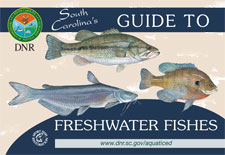Freshwater Fish - Species
Species Specific Regulations
Chain pickerel
Freshwater Fishing License required.
Chain pickerel (Esox niger) - Native
Description: (Anatomy of a Fish)
The chain pickerel is a narrowly elongated fish with a duckbill snout that is long and narrow. The body is olive green in color with rows of a chainlike pattern along the side. A black bar streams straight down from the eye.
Range: Common statewide, except for Broad River system
Average Length: 14-15 inches
Average Size: 12-14 ounces
South Carolina State Record: 6 pounds 4 ounces (1981)
Life Expectancy: Approximately 8 or 9 years
Preferred Habitat
Chain pickerels are found in heavily vegetated areas of sluggish or slow moving rivers, streams, swamps and lakes.
Food Habits
- Fish
Spawning
- Chain pickerel spawn when water temperatures approach 45°F, during March and April. However, they may be fall spawners in the coastal plain.
- One female will be joined by one or two males in submerged vegetation.
- Once the eggs are fertilized, they will stick to the aquatic vegetation and other submerged substrate where they incubate until they hatch unattended.
Miscellaneous
This popular sport fish of coastal plain backwaters and streams is well adapted for its ambush-type feeding behavior. Its body and mouth shape are perfectly designed for capturing and consuming other fish. Chain pickerel have been known to capture and attempt to consume fish equal to their own size. Chain pickerel will usually maintain a motionless posture, resembling a drifting stick. This unanimated behavior reduces its detection by prey (other fish) allowing the pickerel the advantage of surprise. Although they have many small bones, they are a good fish to eat.
Commonly Mistaken Species
One species of fish that is commonly mistaken for this species:
- Redfin pickerel
The chain pickerel, however, has a longer snout and a black bar below the eye that streams straight down from the eye.
Literature Cited
Rohde, Fred C, Arndt, Rudolf G., Foltz, Jeffery W., Quattro, Joseph M. 2009. Freshwater Fishes of South Carolina. University of South Carolina Press, Columbia, South Carolina.
Wildlife and Freshwater Fisheries Division. 2009. South Carolina Guide to Freshwater Fishes.
Fish Illustration by Duane Raver.


